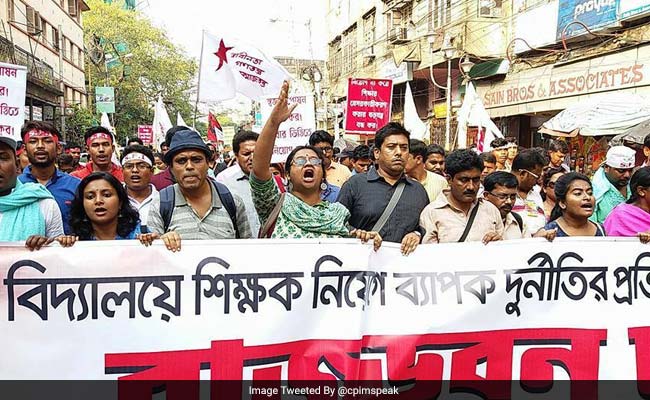We know of the horrific sexual torture Soni Sori, the Adivasi woman activist, was subjected to under the BJP government in a Chattisgarh jail. Stones were inserted into her vagina and rectum. While the cases are different, in Bengal today under a woman Chief Minister, a government that claims to be fighting the authoritarian BJP is acting in the same way towards political activists who are her opponents.
It was March 9. The young women had joined a demonstration to protest against the corruption evident in the appointment of primary school teachers by Mamata Banerjee's government. They were members of the Students Federation of India, one of the organisers of the demonstration. The young people in the march were brutally lathicharged; several including young women were injured and had to be hospitalized. The police armed with the draconian, newly-adopted "Maintenance of Public Order" legislation brought in by the Mamata Banerjee government made their intention clear: any protest, peaceful as it may be, will not be tolerated in Mamata's Bengal. But worse was to follow.

SFI activists protest in Kolkata against irregularities in appointment of primary teachers (March 9)
This is how the AIDWA memorandum describes what happened next: "Instead of being treated as political activists, they were subjected to custodial torture. They were taken to the 'searching room.' Here they were stripped and searched, which consisted of highly objectionable groping of their bodies. One of the young women who was in her menstrual cycle at the time was forced to take off her sanitary pad, to go down on all fours and be 'searched'. All through, they were subjected to the most filthy sexist abuse. The groping and abuse was repeated on March 14. The women personnel responsible made it clear that they were acting orders from above..."
It was obviously a most traumatizing experience. It hardly matters that the perpetrators of the violence were female personnel. For the young women, the nature of the torture, as well as the language used, was heavy with sexual connotations; it was sexual abuse and humiliation. Activists, politically committed as they may be, are often apprehensive and hesitant of making public their horrific experience in custody. The common "shaming" of women activists if they speak about the sexual humiliation they are subjected to, sexist innuendos and comments by opponents, and also a consideration of what would be the impact on other young women activists, prevent cases becoming public. In one particular demonstration I was at in Delhi, a woman requested the organization not to make public her photograph in which the camera had captured a policeman groping her. She said her family members would strongly object and she would be prevented from attending any other demonstration.
But in Bengal, in addition to these factors, women activists often face sexually determined intimidation and terror by goondas of the ruling party. Outside Bengal, it is difficult to understand the extent of this and how it affects every day life. The police in Bengal, or a substantial section of the police and bureaucracy, act as though they are an official wing of the ruling TMC. At least part of the nexus is driven by corruption as so clearly exemplified by the Narada tapes.
These tapes as is well known show a dozen leading functionaries of the TMC, including elected MPs, Ministers and the Mayor of Kolkata, accepting bribes in return for favours to the company. On tape, a senior TMC MP asks that the 20 lakh rupees offered to him be delivered to his "office." At the given time, the bribe is received by a senior police officer stationed in the minister's office. Corrupt police officers and bureaucrats work in tandem to make money while each have a strong stake in working towards the decimation of the Left, the principal and principled opposition, utilizing all means.
It is in the context of this nexus, that the events of March 9 and 10 occurred. Corrupt practices in the recruitment of primary school teachers by the TMC government have ruined the lives of thousands of young people eligible for recruitment. It is but natural that there will be protests. But the corrupt alliance of ruling party politicians, bureaucrats and the police want to ensure that such voices of protest are suppressed. The four young women arrested and tortured were a victim of this political reality.
The NHRC as well as the National Commission of Women have been approached on behalf of the victims for justice. Each and every such incident of the state's violation of human and democratic rights must be challenged and resisted.In making public their horrific experience, the four young women have shown remarkable courage and have helped take forward the struggle for justice, gaining new supporters every day in Bengal.
Brinda Karat is a Politburo member of the CPI(M) and a former Member of the Rajya Sabha.
Disclaimer: The opinions expressed within this article are the personal opinions of the author. The facts and opinions appearing in the article do not reflect the views of NDTV and NDTV does not assume any responsibility or liability for the same.


